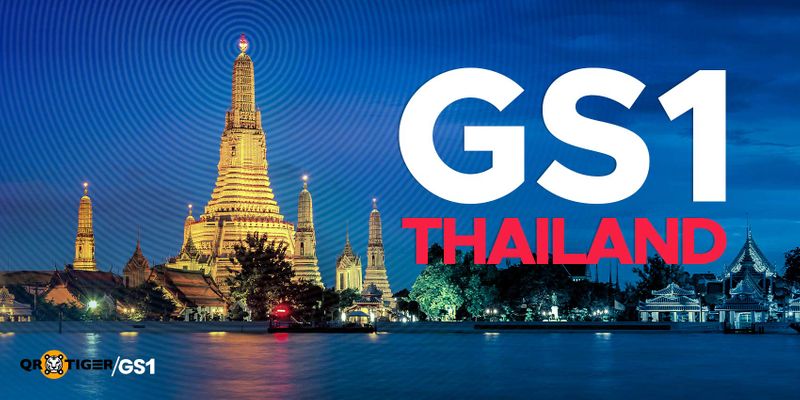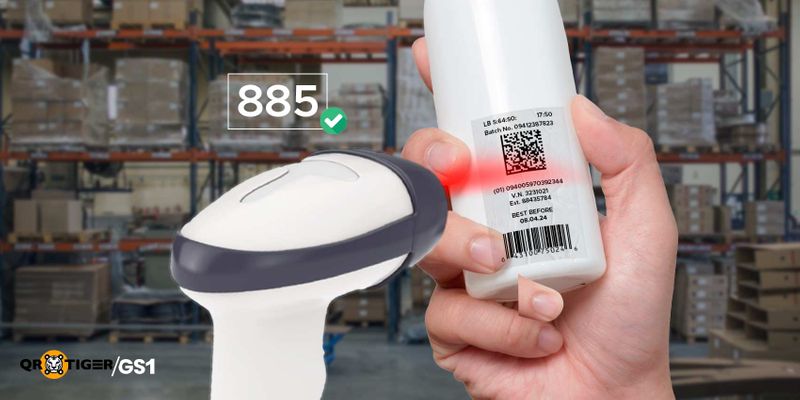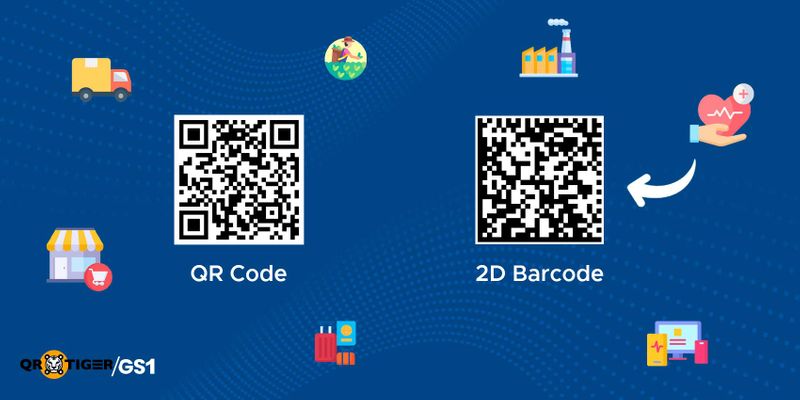GS1 Thailand: Driving Smart Trade and Digital Supply Chains

With the quick evolution in global trade, Thai businesses are embracing digital transformation to stay efficient, competitive, and globally connected. At the core of this transformation are GS1 standards in
Thailand, helping build smarter supply chains and support international trade. These standards help industries boost efficiency, improve traceability, and allow expansion to new markets.
This article explores how the GS1 member organization is shaping the future of commerce through smart service systems, data-led solutions, and a focus on sustainable growth.
Table of Contents
What is GS1 Thailand?
GS1 Thailand (TH) operates within the GS1 Global Network, a non-profit organization active in more than 100 countries. It empowers Thai businesses by advancing GS1 standards that optimize supply chains, meet international trade requirements, and compete more effectively globally. It promotes standardized barcodes, product identifiers, and data exchange formats to support digital transformation across industries.
It also provides digital tools and platforms, such as product registration and traceability systems aligned with global standards. These services aim to streamline operations and promote long-term business sustainability.
Introduced initiatives and collaborated campaigns
GS1 TH collaborates with government agencies, retailers, and manufacturers to promote the adoption of GS1 standards across industries. Through initiatives, it advances traceability, food safety, and digital supply chain efficiency.1) Empowering Thai businesses for global barcode standards
GS1 TH, part of the Federation of Thai Industries, is helping small and medium-sized businesses learn what barcodes are, how to use them, their significance, and how to get them. Through its new FTI Connect Learning Center, it provides training that shows how barcodes can improve product tracking and unlock doors to global trade.
This initiative makes barcode technology more approachable for smaller companies that are clueless about where to start. GS1 TH focuses on the future of barcode technology. It is guiding businesses to adopt advanced 2D barcodes, emphasizing the usage of QR codes to store rich product data like packaging details, expiry dates, and origin information.
This upgrade helps companies meet global sustainability and traceability standards, providing Thai products a competitive edge in world markets.
2) Emerging & high-tech sectors
Under the Thailand 4.0 strategy, the country is investing significantly in electric vehicles (EVs), smart electronics, biotechnology, and digital services. The local GS1 chapter supports this shift by using standardized product IDs and GS1 2D barcodes.
These barcodes facilitate access to real-time data, component-level serialization, and digital twin integration—essential for managing expensive, high-risk products.
GS1 Digital URI also helps connect these products to digital systems, supporting AI, IoT, and smart factory initiatives under the Thailand 4.0 vision.
3) GS1 TH’s role in cross-border durian traceability
GS1 TH played an essential role in helping Thai durian exporters meet China’s strict traceability requirements. It teamed up with GS1 China to help track durians from farms in Thailand to Chinese retailers. This collaboration simplified sharing accurate product data between both countries, helping Thai businesses prove the origin and safety of their fruit.
The collaboration helped build trust between Thai producers and Chinese authorities. The customs and import checks became smoother and more reliable with GS1 barcodes and traceability systems in place.
GS1 TH’s support ensured that Thai durians could confidently enter the Chinese market, boost trade and facilitating future cross-border supply chain cooperation.
4) Partner Alliance Program
The Partner Alliance Program is an initiative that connects GS1 TH members with a wide range of providers, including those in printing and packaging, consulting, and hardware and software solutions.
It unlocks opportunities for knowledge sharing, marketing exposure, and access to useful tools through GS1 TH’s events and platforms.
Partnering with GS1 TH provides the following benefits:
- Access a network of 20,000+ businesses in Thailand.
- Recommend services in the Solution Partner Directory to 300+ members per month.
- Feature promotional media on a website with an audience of 300-500 viewers daily.
- Establish connections through the GS1 TH Networking Dinner event.
- Participate as a speaker in GS1 seminars.
- Publish a special article in the GS1 TH’s E-Newsletter.
- Participate in a booth at the annual meeting with 500+ members.
Note that the benefits vary based on the partner type and the terms and conditions defined by GS1 TH.
GS1 TH services for businesses
GS1 TH offers a suite of services designed to help businesses enhance efficiency and traceability through standardized identification and data solutions. These services are outlined below.
Verified by GS1: Verified by GS1 ensures that product, company, and location information is accurate, standardized, and globally verifiable. Businesses and government agencies can validate products using Global Trade Item Number (GTIN), confirm locations with Global Location Numbers (GLNs), and search for companies by name and country.
Check Digital Calculator: The GS1 Check Digit Calculator is a tool that helps calculate check digits for GS1 barcode numbers based on the Modulo 10 algorithm. It ensures that the numbers are accurate as per the international standards.
The last digit of a barcode number is a computer check digit which ensures that the barcode is correctly composed.
Barcode Verification Service:

The service helps ensure GS1 barcodes can be accurately scanned across logistics, retail, and supply chain environments. High-quality barcodes are essential for smooth integration into partner and retailer systems.
This service has a fee, based on the number of codes and the language of the certificate.
GS1 TH members can submit barcode samples—beginning with the prefix 885—for free quality checks. This applies to both 1D and 2D barcodes, and the number of free checks depends on the annual membership fee.
Note that only GS1 standard barcodes are accepted, including:1D barcodes (like GTIN-8, GTIN-12, GTIN-13, GTIN-14, and GS1-128) and 2D barcodes (like GS1 QR code and GS1 DataMatrix).
Training: Training is available both online and onsite, so you can choose what’s most convenient. Whether you’re a manufacturer, business owner, or exporter, you can consult with the experts from the local GS1 chapter to get clear and accurate guidance.
The member organization makes barcodes easy to understand and apply.
Certification for membership: GS1 member organization offers a certificate to confirm that a company is an active member. This can be used to show customers or authorities proof of official registration. The certificate is provided by email as a PDF, usually within five working days, once all fees are paid.
For companies exporting to China, the GS1 member organization also provides a special certificate validating their GTIN or GS1 Company Prefix. This is often required by Chinese partners to verify barcode details.
Applications of 2D barcodes across industries in Thailand

GS1 helps businesses transition to 2D barcodes (like QR codes and GS1 DataMatrix) to enhance their operational efficiency. These barcodes come with more data handling capacity than traditional 1D codes and facilitates better tracking and transparency.
Sunrise 2027 is a global initiative that empowers retailers to integrate 2D barcodes (such as Data Matrix and GS1 QR codes) into their point of sale (POS) and supply chain systems by 2027.
The transition is not a mandate. 1D barcodes will not be phased out. Businesses can continue using 1D barcodes until the transition is not made compulsory.
During this transition period, including both the 1D and 2D barcodes on the packaging will ensure compatibility with retailers who have yet not integrated 2D barcodes on their packaging.
It's up to companies to decide whether to develop their own software for generating GS1 2D barcodes (by following GS1’s implementation guidelines) or use a third-party service like the GS1 QR code generator by QR Tiger to encode product information using GS1 formats.
Some of the key applications of 2D barcodes across industries in Thailand are discussed here:
Manufacturing & Industry
The local GS1 chapter supports manufacturers—specifically in electronics, automotive, and consumer goods—by enabling end-to-end traceability through 2D barcodes (like GS1 DataMatrix and GS1 Digital Link QR code).
These barcodes encode critical data such as GTINs, batch numbers, and production dates, which optimize inventory management, decrease counterfeiting, and improve product recalls.
In Thailand’s Eastern Economic Corridor (EEC), where advanced manufacturing is growing fast, GS1 standards help companies adhere to global compliance and fulfill digital supply chain demands.
One of the most impactful tools driving this transformation is using the GS1 QR code for inventory and supply chain logistics. By enabling real-time visibility and smarter decision-making, the usage of QR codes significantly boosts operational agility and efficiency across the country’s manufacturing sector.
Agriculture
GS1 TH plays a key role in food safety and export readiness. 2D barcodes are used to encode origin information, harvest dates, and processing details, which are essential for traceability, specifically for exports like seafood, rice, and tropical fruits.
Building on this foundation, using a GS1 QR code for detailed product information allows consumers to access insights on ingredients, origins, and certifications.
These codes keep all stakeholders (manufacturers, suppliers, consumers, etc.) updated with critical data, ensuring supply chain transparency.
Inspiring success story from GS1 TH
GS1 TH has empowered businesses across several industries to enhance traceability, safety, and operational efficiency through barcode solutions. This success story indicates how GS1 standards drive smarter supply chains and boost consumer confidence across the Thai market.
7-Eleven Thailand improves consumer experience through usage of QR codes
Eleven Thailand partnered with GS1 TH to stop expired products from reaching customers. They started using GS1 DataMatrix on the packaging, which included GTINs, batch numbers, and expiration dates.
This made checkout faster by eliminating the need for manual date checks and helped avoid expired items from being sold. It also improved how stock was rotated and managed in stores.
To implement this, 7-Eleven partnered with CPRAM and Harn Engineering Solutions to upgrade packaging machines, printers, and checkout scanners.
The upgrades made it possible to create barcodes in real-time and integrate smoothly into existing systems.
The result: smoother operations, better food safety, and increased customer trust—uplifting the standard for retail in Thailand.
Why register GS1 TH?
GS1 TH empowers businesses to modernize operations, improve product traceability, and compete globally through standardized identification and data-sharing systems.
The following points justify the reasons to choose GS1 TH:
- GS1 TH promotes Smart Service systems that digitally connect product data, orders, and logistics.
- It supports businesses in adopting 2D barcodes and EPCIS to gain better supply chain visibility.
- Businesses in manufacturing, retail, logistics, and healthcare obtain tailored training, Thai-language support, and consulting to adopt these standards.
- Whether you're in retail, healthcare, manufacturing, or logistics, the local GS1 chapter offers tailored guidance and training.
- Using these standards speeds up product listings, facilitates real-time tracking, and improves warehouse efficiency.
- The local GS1 chapter helps local companies align with global trends and supports sustainable growth.
Advancing Thai Trade with Global Standards
GS1 Thailand helps businesses enhance product traceability, optimize logistics, and meet global compliance through standardized identification systems.
Its services, ranging from barcode issuance to digital document exchange, make business operations more efficient and strengthen consumer trust. By joining GS1 TH ensures your business stays future-ready in a swiftly evolving digital economy.
Frequently asked questions
How can I get a membership certificate?
To obtain a Certificate of Membership, you can download the form and attach proof of your latest annual membership payment. You then need to send an email to info@gs1thailand.org. The GS1 TH team will respond after reviewing your request.
Does online registration mean my application is already submitted?
No, filling out the online form is just the first step. After completing it, you’ll need to print the application and submit it to GS1 TH either in person or by mail.
Once the staff reviews your documents and confirms everything is complete and accurate, they’ll send you an email with payment details and next steps.
What is GS1 Traceability?
GS1 Traceability is a global framework based on standards for tracking products from origin to destination. It records transport routes and product details at every step. So, it improves product safety, manages inventory better, and boosts supply chain transparency.
It also supports exports to countries with strict rules and also makes product recalls faster and easier.
DISCLAIMER: We acknowledge that GS1, as well as the materials, proprietary items, and all related patents, copyright, trademark, and other intellectual property (collectively, “intellectual property”) relating to its use, are the property of GS1 Global, and that our use of the same shall be in accordance with the conditions provided by GS1 Global.




